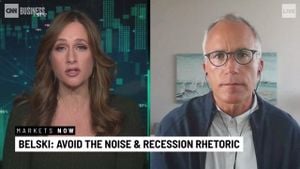President-elect Donald Trump’s nomination of Robert F. Kennedy Jr. as secretary of the Department of Health and Human Services (HHS) has sent shockwaves through public health and agricultural communities alike. Kennedy, known for his strong skepticism of vaccines and controversial views on public health, could wield significant influence over pivotal government agencies, including the Food and Drug Administration (FDA) and the Centers for Disease Control and Prevention (CDC). His appointment would not just affect health policy but also spark debates on food safety, environmental regulations, and public trust in health institutions.
Kennedy's platform has been characterized by his pledge to "Make America Healthy Again," which suggests sweeping changes. He has raised alarms about what he calls the "mass poisoning of American children" through food additives, seed oils, and pesticides, claiming systematic corruption within federal health agencies. His intentions appear to focus on dramatically changing food policies by proposing to eliminate certain widely used ingredients and criticizing established practices.
For decades, Kennedy has promoted the idea of eliminating chemicals he equates to public health threats. His statements about food safety have alarmed agricultural stakeholders, worried about potential disruptions to traditional farming practices. For example, his desire to eliminate fluoride from public water supplies goes against long-standing public health initiatives aimed at preventing tooth decay. The reaction from public health experts, particularly those who have long supported these initiatives, has been one of concern.
Trump’s endorsement, coupled with Kennedy’s controversial history, raises questions about how his leadership would reshape HHS. Kennedy has hinted at radically overhauling the FDA’s nutrition department, aggressively targeting large pharmaceutical corporations, and reworking treatment protocols to address issues like obesity by focusing on food systems rather than just medications. His critics, meanwhile, assert these changes risk sidelining established science and undermining public trust.
During the campaign, Trump vowed to grant Kennedy the freedom to "go wild" on health care, supporting Kennedy’s assertions about reforming food policies. If confirmed by the Senate, Kennedy would lead initiatives linked to public health services affecting taxpayers — including Medicare and Medicaid — and influence vaccine availability and regulation at the federal level.
Concerns extend beyond just health care policies to agricultural practices as well. Kennedy's proposed restrictions on pesticides, claims about seed oils, and assertions about genetically modified organisms have met with skepticism from agricultural leaders who fear these changes could stifle innovation. Dana O’Brien, president of BioHarbor Strategies, cautioned about the possible negative effects on rural economies and farmer livelihoods if Kennedy’s proposals materialize.
Recent public statements from Kennedy reveal his aggressive stance on reform. He has criticized long-held positions about FDA practices, indicating he aims to dismantle what he perceives as institutional corruption. His calls for transparency and reform reflect a broader populist movement. Still, they also prompt questions about the role evidence and scientific consensus will play under his leadership.
Public health experts are worried about the potential for Kennedy’s skepticism toward vaccines to transform public health guidelines. Many professionals question whether his past claims about vaccines, including debunked assertions linking them to autism, will resonate with the broader American public. Kennedy has maintained he does not seek to ban vaccines entirely, yet his influence over FDA approvals, coupled with his history of inflaming vaccine skepticism, raises the stakes considerably.
Experts are divided on the ramifications of Kennedy’s confirmation. Some see it as potentially beneficial, arguing his outsider perspective could challenge corporate dominance and offer fresh ways to address entrenched health crises. Others argue his confirmation would raise the risk of regression to discredited practices and philosophies, diminishing progress made over decades.
Kennedy’s nomination has also sparked reactions from within his own family. Caroline Kennedy, U.S. Ambassador to Australia and cousin to RFK Jr., did not hesitate to disapprove of his vaccine views, labeling them "dangerous". She emphasized the importance of evidence-based practices and highlighted the legacy of public health work from their family members. Many regard her remarks as indicative of a broader disapproval among public figures connected to traditional Democratic values.
Looking forward, Kennedy's potential confirmation raises pressing questions about the future of vaccine protocols and food safety regulations. Evaluations by health professionals indicate he holds significant sway over decisions affecting national public health strategies. His leadership at HHS could engender substantial changes, especially if he is determined to confront the established practices of health institutions.
Advisors within the healthcare community are advocating for cautious scrutiny. Understanding how Kennedy's perspectives may redefine public health standards, particularly those concerning vaccine distribution and food safety practices, remains pivotal as debate swirls. The complex balance between health innovation and conservation of rigorous scientific methodologies will likely shape discussions leading to the final confirmation vote.
With mounting attention on Kennedy's influence, it becomes imperative to monitor the consequences for public health and nutrition. His actions, should he secure the role, will undoubtedly affect policymaking — making it necessary for both supporters and detractors to engage actively at local, state, and national levels. Whether Kennedy's vision aligns with the prevailing standards of public health or veers toward controversial methodologies remains to be seen. So, as discussions intensify, the reality of Trump’s administration continues to evolve with unexpected alliances and ideological battles over the future of health policy.



